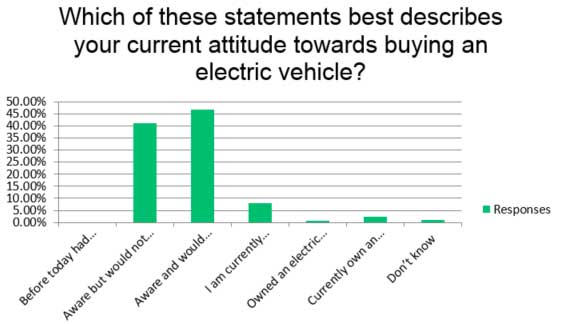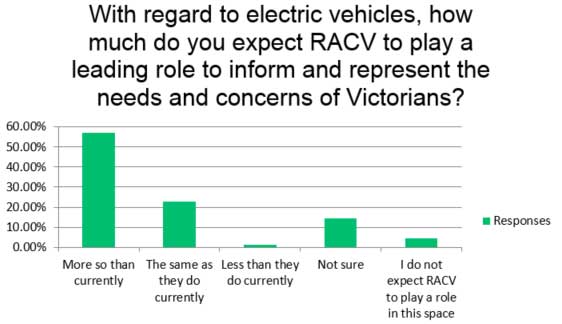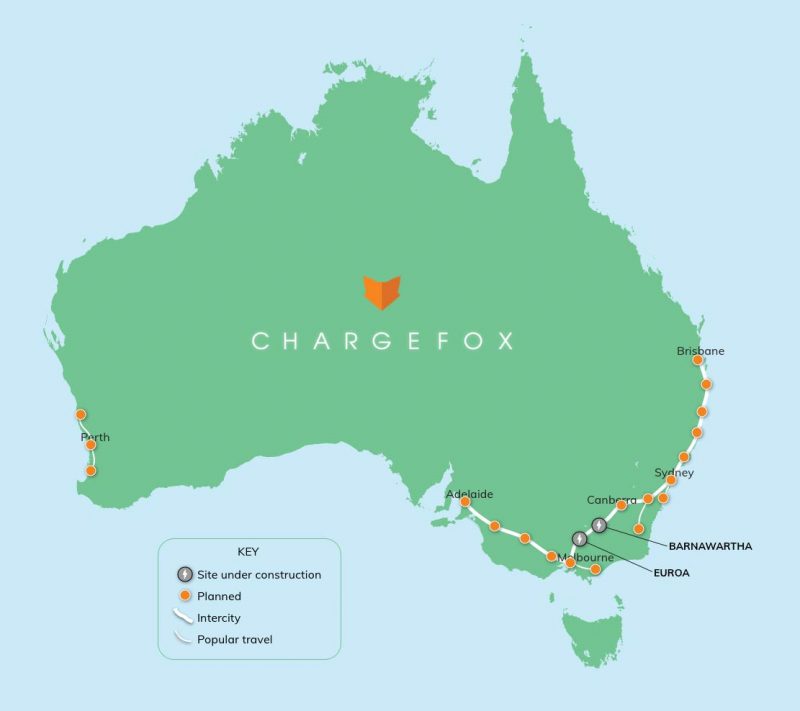“The world has sent a clear signal; the future is electric. All that’s left is for Australia to decide whether we want to be makers or takers in the future of mobility.”
70% of Victorian drivers want electric vehicle incentives: survey
The majority of Victorian drivers would like to see government incentives and policy introduced to help reduce the cost of switching to electric cars, a new survey has shown.
With one in two drivers in the state saying they would consider buying an electric vehicle when they next purchase a car, the new survey released by motorists association the RACV has revealed that over 70 per cent of Victorians would like help with the higher up front costs of electric vehicles.
This is up 15 per cent from just two years ago – in 2017, the same survey elicited a response of just 55 per cent of Victorians who would like to see government incentives for electric vehicles, according to a submission by the RACV to the 2017 Victorian state government inquiry into electric vehicles.
The survey, which is the latest conducted annually by the RACV in collaboration with the Electric Vehicle Council (of which it is a member), attracted answers from almost 1,300 RACV members and indicates that the call for government policy to help with the transition to electric vehicles is on the rise.
Electric vehicles currently only account for about 0.2 per cent of Australia’s electric vehicle market, with the higher price of EVs, availability of public charging infrastructure and range having been identified in numerous surveys as a barrier to EV uptake.
The survey suggests Victorians are asking for help from the government with these barriers in no small numbers.
Almost 70 per cent of respondents would like help with the cost of installing charging infrastructure, over 70 per cent would like to see public charging infrastructure policy implemented by the government, while almost a quarter would like to see reduced road tolls and parking costs.
Source: RACV
The survey also suggests that Victorian drivers are increasingly aware of the fact that a transition to electric vehicles is on the cusp in Australia (no doubt at least in part due to the pervading discussion and ludicrous fake news campaign by the incumbent Coalition around electric vehicles prior to last month’s federal election).
In fact, one in two Victorians would consider buying an EV when next they consider buying a car.
When asked about what specifications they would like in an EV, Victorians indicated that they would expect to have at least 450km of driving range and would like to be able to charge their vehicles in half an hour when away from home, according to the survey.
Source: RACV
Overwhelmingly, the survey also showed that 80% of Victorians believe the RACV should take a leading role in representing drivers in regard to the transition to electric vehicles.
Source: RACV
The RACV is already doing some work towards this; in 2018 along with other car clubs, as well as Wilson transformers and Car Sales’ Greg Roebuck, it joined forces with ARENA to fund a $15 million ultra-fast EV charging network from Adelaide to Brisbane and around Perth.
With more and more electric car models being made available to buy in Australia every month, the need for increased infrastructure is undeniable.
Last month the Tesla Model 3 was made available to order online and next month it and others from Hyundai, BMW, Renault and Jaguar, will be joined by the 2020 Nissan Leaf, followed by EV offerings from Mercedes-Benz, Audi and more.
Car clubs, ARENA get behind solar-powered ultra-fast EV charging network
Australia’s leading automobile clubs and the Australian Renewable Energy Agency have joined forces to help fund a $15 million plan to install an ultra-fast EV charging highway across much of the country.
Melbourne-based ChargeFox will roll out what is being described as Australia’s most comprehensive EV infrastructure to date, with $6 million funding from ARENA, and another $8 million investment from the Australian Motoring Services, Wilson Transformers and founder of CarSales, Greg Roebuck.
Several interstate highways between major Australian cities will benefit from the funding, which will go towards the creation of the country’s first ultra-fast EV charging network powered by renewable energy.
The new interstate EV charging network will be larger than Queensland’s own 18-strong Electric Super Highway, with 21 sites stretching across the country, but will meet up with it to ensure EV drivers can access charging sites all the way from Adelaide to Cairns.
Spaced 200km apart, the charging sites will service the highways between Adelaide, Melbourne, Sydney, Canberra, and Brisbane, with Perth getting its own network extending both north and south of the western capital.
Drivers will be able to use the stations via an app, and each station will be “be public, open-access to all EV models currently sold in Australia”, according to ARENA.
The spacing of the chargers is a nod to safety advice for long distance driving to break every two hours, and sits well within the range of all new EVs about to enter the Australian market with the next 12 months or so.
ARENA chief Darren Miller says the funding will bring Australia – which has extremely slow uptake of EVs compared to other countries, due in part to a lack of affordable models and charging infrastructure – in line with infrastructure rollout in other countries.
“Australia needs to catch up to ensure that we can experience the same benefits of improved driving experience, lower operating costs, and better environmental outcomes that electric vehicles offer,” Miller said in a statement.
“This will not only encourage more people to purchase EVs, but will also ensure that all charging is coming from renewable energy and provide a useful test case for charging EVs from remotely located, distributed renewable generation.
“Range anxiety is a key barrier to uptake of EVs in Australia, but this network will help alleviate that concern by giving motorists comfort they can travel long distances.”
ChargeFox will get the ball rolling, so to speak, at two sites: Euroa in Victoria as well as Barnawatha, just near Albury-Wodonga on the NSW/Vic border.
The network will be overseen by Chargefox’s head of charging, Evan Beaver – who was in charge of the first wave of Australian Tesla chargers.
Each site will offer 2 EV chargers with both CHAdeMO or CCS2 sockets that will deliver a minimum of 150kW and up to 350kW, allowing for an extra 200-400km of range within 15 minutes – just enough time for a cup of coffee and a leg-stretch.
Speaking with The Driven, Chargefox co-founder Tim Washington explained said that “some sites will have on-site solar, and every site will be backed up by grid power.”
“We will be buying 100% green power,” he said, to bring the installations in line with Chargefox’s goal to make driving EVs a completely zero emissions undertaking.
“Chargefox has a vision that one day 100 per cent of road transport will be powered by renewable energy and from day one our ultra-rapid chargers will be accessible to all Australian drivers,” says Chargefox CEO Marty Andrews.
Michael Reed, CEO Australian Motoring Services (which includes NRMA, RACV, RACQ, RAC, RAA and RACT) says that the infrastructure roll out will help its members benefit from the shift towards higher EV uptake.
“The benefits of EVs include much lower running costs, they are cheaper to maintain, and they reduce harmful air pollution.
“By investing in Chargefox, the Australian Mobility Clubs, are building on their current investment to improve the infrastructure of this country and remove one of the major barriers that limits the adoption of EVs.
“Having a national network of ultra-rapid charging stations will enable our members and all drivers of EVs to travel confidently between cities and states,” Reed says.
The Electric Vehicle Council chief Behyad Jafari says the announcement demonstrates that, “Australia’s EV industry stands ready to invest in new businesses and jobs that will last long into the future.”
“What Australia’s been missing is decisive leadership from the national government that demonstrates Australia’s readiness and support of e-mobility to the world.”
Australia lags behind the world in electric vehicle policy, as noted repeatedly by The Driven, but with this most recent development, the wheels are gradually beginning to turn.
“The good news is that, should the government come to the table, there is a burgeoning and invigorated industry potential for them to tap into,” Jafari says.
“The world has sent a clear signal; the future is electric. All that’s left is for Australia to decide whether we want to be makers or takers in the future of mobility.”
Chargefox also received funding to the tune of $1 million in a grant from the state of Victoria earlier this month, to assist in the creation of the two Victorian sites.
ARENA has also recently granted funding to Charge Together for the development of an app earlier this year that will help consumers understand the impact of rooftop solar, home batteries and electricity tariffs when making the decision to buy an electric car.
https://thedriven.io/category/ev-news/electric-cars/
- Forums
- ASX - By Stock
- AVZ
- Understanding lithium demand
Understanding lithium demand, page-552
- There are more pages in this discussion • 1,039 more messages in this thread...
You’re viewing a single post only. To view the entire thread just sign in or Join Now (FREE)
Featured News
Add AVZ (ASX) to my watchlist
 (20min delay) (20min delay)
|
|||||
|
Last
78.0¢ |
Change
0.000(0.00%) |
Mkt cap ! $2.752B | |||
| Open | High | Low | Value | Volume |
| 0.0¢ | 0.0¢ | 0.0¢ | $0 | 0 |
Featured News
| AVZ (ASX) Chart |
Day chart unavailable













